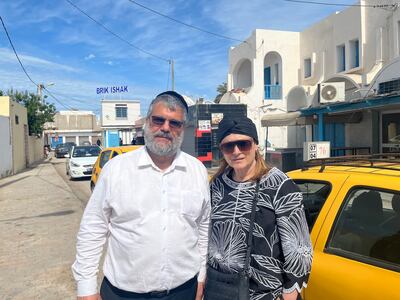In Djerba island's main Jewish neighbourhood, Hara Kebira, residents silently grieve for Aviel Haddad and Benjamin Haddad; the friends they lost in an attack on the local synagogue on Tuesday night.
Some restaurants and shops have closed their doors, as many head to the capital Tunis, where authorities have taken the two Jewish victims for autopsy.
But despite an overwhelming sense of sadness felt in the Hara Kebira Jewish quarter, faint sounds of friendly conversations can be heard.
Djerba is home to more than 1,000 Jews, North Africa’s largest Jewish community.
Thousands of Jews from around the world visit the island every year in a pilgrimage to Africa’s oldest synagogue, Ghriba.
Houri Mickael, 56, a survivor of the attack, enjoying a meal with his family at a tiny Brik [a deep fried Tunisian pastry] restaurant, recalled the moment the attack unfolded.
“The moment my wife and I arrived by taxi to the [synagogue’s] front door, we could hear the gunfire. Police immediately took us inside, and we remained locked there for two hours,” he said.
Despite the anxiety of the unknown, Mr Mickael said he felt safe.
“They did their best to defend us, we felt we were safe.”
Mr Mickael, who was born in Djerba and left at the age of 12, told The National that the Tunisian police treated them with kindness and respect.
“I don’t think that the work of one person could destroy the reputation of an entire country like Tunisia,” Mr Mickael told The National.
“Tunisia and its people mean a lot to me, this man has failed in his life and does not even know what Islam means.
“No religion will ever say that you need to love one person and hate another … we are all born from the same place” he added.

For many years, Mr Mickael and his wife, Gila, made it a habit to visit Ghriba to reconnect with their roots. They plan to return next year.
“This man has done a lot of harm to people and to his country, but Tunisia has always been an open and hospitable country so I do not believe that something like this would deter me from coming back,” Mr Mickael told The National.
He understands, however, the implications of this attack, but remains hopeful.
“I understand that what happened was shocking for sure and people have the right to panic, But I believe time is capable of healing everything,” Mr Mickael said.
Mr Mickael and his wife Gila are not planning to cut their visit short.
“This thing could have happened anywhere in the world. We should just take this into consideration and reinforce security but not to the extent of saying that we do not want to stay here any more, it’s a mistake.”
According to authorities, more than 5,000 Jews, mostly from abroad, participated in this year’s pilgrimage.
The event takes place around Lag BaOmer, on the 33rd day of the Jewish festival of Passover, which celebrates the Jews' escape from Egypt.
The annual pilgrimage is attended by Jewish and Muslim locals, who use it as an opportunity to celebrate a peaceful coexistence between the different communities in the country.










